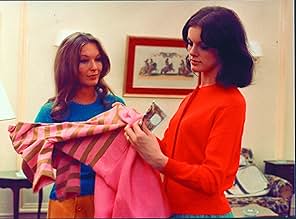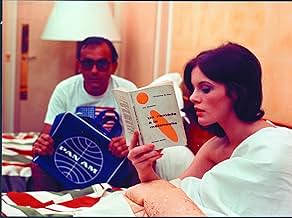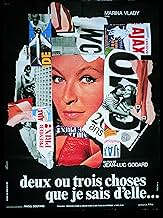Duas ou Três Coisas Que eu Sei Dela
Um dia na vida de uma dona de casa/prostituta parisiense, intercalado com reflexões sobre a Guerra do Vietnã e outras questões contemporâneas.Um dia na vida de uma dona de casa/prostituta parisiense, intercalado com reflexões sobre a Guerra do Vietnã e outras questões contemporâneas.Um dia na vida de uma dona de casa/prostituta parisiense, intercalado com reflexões sobre a Guerra do Vietnã e outras questões contemporâneas.
- Prêmios
- 1 indicação no total
- Narrator
- (narração)
- Young Man
- (não creditado)
- Girl Talking to Robert
- (não creditado)
- Girl in Bath
- (não creditado)
- Christophe Jeanson
- (não creditado)
- Meter Reader
- (não creditado)
- Marianne
- (não creditado)
- Monsieur Gehrard
- (não creditado)
- Girl
- (não creditado)
- Man in Basement
- (não creditado)
- Author
- (não creditado)
- Pécuchet
- (não creditado)
- John Bogus
- (não creditado)
- Woman in Basement
- (não creditado)
- Bouvard
- (não creditado)
- Robert Jeanson
- (não creditado)
- Roger
- (não creditado)
- Direção
- Roteiristas
- Elenco e equipe completos
- Produção, bilheteria e muito mais no IMDbPro
Enredo
Você sabia?
- CuriosidadesWhen Juliette drops off her daughter at the day care/brothel, there is a painting on the wall of a screen shot of Nana Kleinfrankenheim, portrayed by Anna Karina, in Viver a Vida (1962).
- Citações
Narrator: Since social relations are always ambiguous, since my thoughts divide as much as unite, and my words unite by what they express and isolate by what they omit, since a wide gulf separates my subjective certainty of myself from the objective truth others have of me, since I constantly end up guilty, even though I feel innocent, since every event changes my daily life, since I always fail to communicate, to understand, to love and be loved, and every failure deepens my solitude, since - since - since I cannot escape the objectivity crushing me nor the subjectivity expelling me, since I cannot rise to a state of being nor collapse into nothingness - I have to listen, more than ever I have to look around me at the world, my fellow creature, my brother.
- ConexõesEdited into Notes pour Debussy - Lettre ouverte à Jean-Luc Godard (1988)
- zetes
- 10 de mar. de 2002
- Link permanente
Principais escolhas
- How long is 2 or 3 Things I Know About Her?Fornecido pela Alexa
Detalhes
Bilheteria
- Faturamento bruto nos EUA e Canadá
- US$ 104.038
- Fim de semana de estreia nos EUA e Canadá
- US$ 11.214
- 19 de nov. de 2006
- Faturamento bruto mundial
- US$ 104.038
- Tempo de duração1 hora 27 minutos
- Mixagem de som
- Proporção
- 2.35 : 1
Contribua para esta página




























